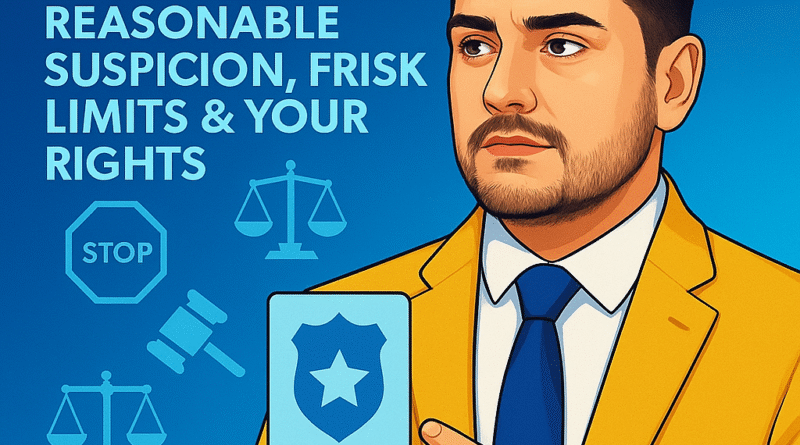Police Stops 101: Reasonable Suspicion, Frisk Limits & Your Rights
Police stops: reasonable suspicion basics. In the United States, a brief detention—on foot or in a car—requires reasonable suspicion: specific, articulable facts that, taken together, suggest a person is involved in criminal activity. It is more than a hunch and less than probable cause. The standard comes from Terry v. Ohio (1968) and shapes what officers can do, how long the stop may last, and whether a frisk or car check for weapons is allowed. Knowing these rules helps you assert rights calmly and avoid escalation.
What is reasonable suspicion?
Reasonable suspicion is a flexible, common-sense standard judged under the totality of the circumstances. Officers must be able to point to specific and articulable facts—plus rational inferences—linking you to a particular offense. Courts credit an officer’s training and experience, but vague profiles or inexpressible “gut feelings” are not enough.
Usually sufficient (context matters)
- Unprovoked flight on noticing police in a high-crime area (Illinois v. Wardlow).
- Reliable tip with predictive details or a 911 call bearing indicia of reliability (Navarette v. California).
- Traffic violations observed (Whren v. United States—pretext doesn’t invalidate the stop).
- Owner’s license revoked; officer sees the car and infers the owner is the driver (Kansas v. Glover).
Usually insufficient by itself
- Presence in a high-crime area with nothing more.
- General nervousness or avoiding eye contact.
- Refusing to answer questions during a detention.
- Race, ethnicity, or other protected traits.
When can police stop you?
| Type | Legal trigger | Examples | Notes |
|---|---|---|---|
| Consensual encounter | No suspicion required | Officer approaches and asks to talk | You are free to leave; ask, “Am I free to go?” |
| Terry stop (pedestrian) | Reasonable suspicion | Brief detention to ask focused questions | Frisk only if RS you’re armed and dangerous |
| Traffic stop | Traffic violation or RS of crime | Speeding, expired tags, weaving | Mission is license/registration, warrants, and safety tasks |
| Checkpoint | Special needs (e.g., DUI safety) | Sobriety checkpoints | Cannot be for ordinary crime control (Indianapolis v. Edmond) |
Scope and duration of a stop
Even with reasonable suspicion, an officer’s actions must be reasonably related to the purpose of the stop and last no longer than necessary. In a traffic stop the “mission” includes checking license and registration, verifying insurance, running warrants, and addressing the traffic violation. Rodriguez v. United States (2015) holds that police may not prolong the stop beyond that mission to pursue unrelated aims—like a dog sniff—unless they develop new reasonable suspicion or obtain consent.
Stop + basic questions
Mission tasks (license, warrants)
Unrelated delay w/out RS = unlawful
Frisks and protective searches
A pat-down is not automatic. Under Terry, an officer needs reasonable suspicion that you are armed and dangerous. The frisk is a limited outer-clothing pat for weapons; manipulation of objects for evidence is improper (Minnesota v. Dickerson, “plain feel”). For vehicles, officers may do a quick sweep of areas where a weapon could be hidden and accessed (Michigan v. Long).
Officer safety tools (typical)
- Ordering the driver out of the car (Pennsylvania v. Mimms).
- Ordering passengers out (Maryland v. Wilson).
- Frisking a passenger with RS he is armed (Arizona v. Johnson).
Searches that need more
- Opening containers for evidence needs probable cause, a warrant exception, or consent.
- Prolonged questioning unrelated to the stop requires RS or consent (Rodriguez).
Common facts and how courts evaluate them
| Fact | Usually helps RS | Usually does not suffice alone | Case notes |
|---|---|---|---|
| High-crime area | Only with additional behavior (e.g., evasive flight) | Standing or walking normally | Wardlow: flight + area supported RS |
| Anonymous tip | When 911 reliability + predictive details or corroboration exist | Bare, unverified accusations | Navarette: 911 caller, vehicle details, contemporaneous report |
| Traffic infraction | Always justifies a stop | — | Whren: pretext irrelevant if objective violation |
| Officer’s reasonable mistake | May still justify stop | Unreasonable misreading of clear law | Heien v. North Carolina |
| Odor of marijuana | Varies by state after legalization | Odor alone may be insufficient in some jurisdictions | Check local statutes/cases |
| Registration/owner mismatch | RS if owner unlicensed or wanted | None if officer knows owner is not the driver | Glover |
Your rights during a stop
What you may do
- Ask, “Am I free to leave?” If yes, leave calmly.
- Remain silent about unrelated matters; you must provide license/registration in a traffic stop.
- Refuse consent to a search: “I do not consent to searches.”
- Record the encounter where lawful (most states permit recording of on-duty police in public).
- Ask for a supervisor if the stop becomes prolonged without explanation.
What to avoid
- Physical resistance or sudden movements.
- Lies or false documents (can create separate crimes).
- Reaching into pockets/compartments without telling the officer.
Scripts that are short and respectful
To clarify detention: Officer, am I free to go?
To refuse consent: I don’t consent to any searches.
To end a consensual talk: I don’t wish to answer questions. Have a safe day.
To remain silent (after arrest): I’m invoking my right to remain silent and I want a lawyer.
What officers can and cannot do (quick matrix)
| Action | Allowed with | Limits |
|---|---|---|
| Order driver or passengers out | Lawful traffic stop | For safety; still needs RS for a frisk |
| Frisk pat-down | RS you’re armed and dangerous | Outer clothing only; no evidence fishing |
| Dog sniff | During lawful stop without delay | Cannot extend the stop for it (Rodriguez) |
| Search car compartments | Probable cause, consent, or protective sweep (Long) | Protective sweep limited to places a weapon could be hidden |
| Prolonged questioning about unrelated crime | New RS or consent | Otherwise unlawful and evidence can be suppressed |
If the stop was unlawful: suppression & remedies
Evidence obtained after an illegal stop can be excluded under the exclusionary rule and the “fruit of the poisonous tree” doctrine. A defense lawyer may file a motion to suppress arguing there was no reasonable suspicion, the stop was prolonged, or the frisk/search exceeded its bounds. Keep the citation/ticket, note names and car numbers, and preserve any body-cam request or your own recordings.
Quick Guide
- Reasonable suspicion: specific, articulable facts + rational inferences (Terry).
- Traffic stops: mission limited to ID, warrants, and the violation; no Rodriguez delays.
- Frisk: needs RS you’re armed and dangerous; car protective sweep allowed only for weapons reach.
- Pretext stops: valid if a real violation occurred (Whren).
- Ask: “Am I free to go?” and “I do not consent to searches.”
- Record where lawful; stay calm; don’t argue roadside—save it for court.
FAQ
1) Can an officer stop me just for looking nervous?
Not by itself. Nervousness is common in police encounters. It may contribute to reasonable suspicion only with other specific facts.
2) If I was speeding, can officers investigate unrelated drug crimes?
They may ask questions, but they cannot prolong the stop for unrelated aims without new reasonable suspicion or consent (Rodriguez).
Further reading:
3) Do I have to identify myself?
During a lawful stop, a driver must show license/registration. Pedestrians in “stop-and-identify” states may have to give their name when lawfully detained (Hiibel); check local law.
4) Can a pretext stop be challenged?
Courts don’t consider the officer’s hidden motive if there was an objective traffic violation (Whren). You may still challenge the length or scope of the stop.
5) The officer said I was free to go but kept asking questions. What then?
If you are truly free to leave, it’s a consensual encounter. You can end it by saying, “I don’t wish to answer questions,” and walking away.
6) What if the officer made a mistake about a law?
An objectively reasonable mistake can still justify a stop (Heien). Unreasonable misunderstandings should not.
7) Can police frisk passengers automatically?
No. They may order passengers out, but a frisk requires reasonable suspicion the passenger is armed and dangerous (Arizona v. Johnson).
8) Are dog sniffs always allowed?
Only if they do not add time to the stop and the stop is otherwise lawful (Illinois v. Caballes and Rodriguez).
9) What if the stop turns into an arrest?
Miranda rights attach during custodial interrogation. You may say: “I’m invoking my right to remain silent and I want a lawyer.”
10) Does the “odor of marijuana” still create probable cause?
It depends on your state’s laws after legalization and court rulings. In some places odor alone no longer suffices; in others it may.
11) Can the officer search my phone during a stop?
No, not without consent or a warrant (absent exigency). Riley v. California protects digital contents.
12) How long can a Terry stop last?
No fixed minutes; it must be reasonable given the mission. The longer it goes without progress, the more scrutiny a court applies.
Legal / Technical basis (plain-English notes)
- Terry v. Ohio (1968): stops and frisks require reasonable suspicion based on specific, articulable facts; frisk limited to weapons.
- Whren v. United States (1996): traffic stops are valid if there is an objective violation, even if pretextual.
- Illinois v. Wardlow (2000): unprovoked flight in a high-crime area supports reasonable suspicion.
- Navarette v. California (2014): certain 911 tips can supply reasonable suspicion when sufficiently reliable.
- Heien v. North Carolina (2014): a reasonable mistake of law can still justify a stop.
- Rodriguez v. United States (2015): officers may not prolong a stop to investigate unrelated crimes without new RS or consent.
- Kansas v. Glover (2020): officers may infer the registered owner is driving when that inference is reasonable.
- Pennsylvania v. Mimms (1977) & Maryland v. Wilson (1997): officers may order driver/passengers out for safety.
- Arizona v. Johnson (2009): frisk of a passenger needs RS the person is armed and dangerous.
- Michigan v. Long (1983): protective sweep of a car for weapons with RS.
- Minnesota v. Dickerson (1993): “plain feel” doctrine limits frisk manipulation.
- Riley v. California (2014): phone searches generally require a warrant.

